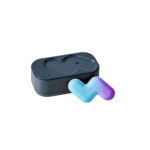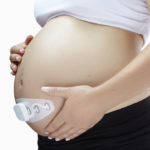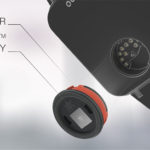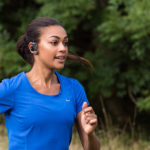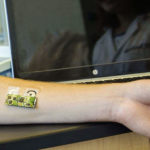One of the more interesting products we saw at CES earlier this year was the Fever Scout, a reusable soft wearable thermometer. We held off writing about it because it hadn't gotten FDA approval -- a deficit the company now says has been remedied. We generally like this category: TempTraq, a one-time use disposable thermometer patch was a big hit last year. But VivaLnk's … [Read more...]
Withings Brand to Vanish as Nokia Takes Over
As one of its lesser-heralded announcements at Mobile World Congress this week, Nokia said it would retire the Withings wearables brand this summer, relaunching the products under the Nokia name. Withings has been one of the longer-lasting brands in the wearables and consumer digital health fields. It was bought by Nokia in April of last year for € 175 million. Nokia, … [Read more...]
New Wearable Tracks Pregnancy Contractions: CES
We spent some time on the phone in the weeks before CES with Eric Dy, CEO of Bloomlife, a new company with a wearable monitor that tracks uterine contractions during pregnancy. It's an interesting product and approach, one that's being unveiled at CES. Contractions can be an important indicator of fetal health but are often subtle things and can be missed. There are existing … [Read more...]
K’Track Wristwear Monitors Glucose Without Blood Stick: CES
2017 will bring a flood of health-related wearables that should be able to live up to their claims, and PKvitality's is among the first out of the gate. Its K'Track line of wrist-worn trackers uses microneedles to "taste" fluid just below the skin's surface and analyze it for glucose or lactic acid. The K'Track Glucose and K'Track Athlete use the same mechanism: a capsule of … [Read more...]
Bodytrak “Hearable” Tracks Temp as Well As Movement: CES
Ear-worn tracking devices are becoming increasingly common. At CES, Bodytrak unveiled the first one that not only senses movement and heart rate, but real-time body temperature as well. It's quite a sensor package (much of it using Valencell hardware): core body temp, heart-rate, Vo2, speed, distance, cadence, as well as retaining audio capabilities. The data is sent via … [Read more...]
Apple Watch’s Heart Monitor is More Accurate than Fitbit’s, Says JAMA
The journal JAMA Cardiology has published a research letter that found that the Apple Watch's heart rate monitor is more accurate than the one in Fitbit's Charge HR, and is matched only by the Mio Alpha. The study, led by doctors at the Cleveland Clinic, compared the heart rates reported by monitors in a range of wrist-worn consumer devices to the rates reported by an EKG … [Read more...]
Cancer and Wearable Technology: Home Visits without the Visit
Cancer treatment has become comparatively easier to live with over the past decades, without actually becoming out and out palatable. And for a lot of patients, the treatment is still worse than the disease. Not that living with the disease is ever a walk in the park. A friend of ours who knows once said that deciding whether to undergo treatment for cancer was like deciding … [Read more...]
Hey, Dude, Answer Your Phone, You’re Drunk!
There’s a new entry in the rapidly expanding wearable tech category of "Who Would Buy This?": a patch that sends your phone a text when you’re “too drunk.” What’s your phone going to do, call a cab? If you’re that drunk, you probably can’t even focus on a text message. And chances are pretty good that you know you’re drunk, although “too drunk” is a relative condition unless … [Read more...]
Wearables Moving from Tracking Fitness to Fighting Chronic Disease
At a time of rumors that the fitness wearables market might be slackening, there is a continuing increase in the use of the technology in helping people with far more serious problems than getting their 10,000 steps. Intel and Israeli pharmaceutical company Teva, for example, have recently agreed to collaborate to develop a wearable to track disease progression in people with … [Read more...]
Study Finds That Fitness Trackers May Not Help Weight Loss
A study led by scientists at the University of Pittsburgh has found that people who wear fitness trackers may lose less weight than people who don't. As reported in JAMA, the study followed 471 overweight adults between 18 and 35 years old for two years. The group was put on a low-calorie diet for six months, instructed to increase their physical activity, and were counseled … [Read more...]
